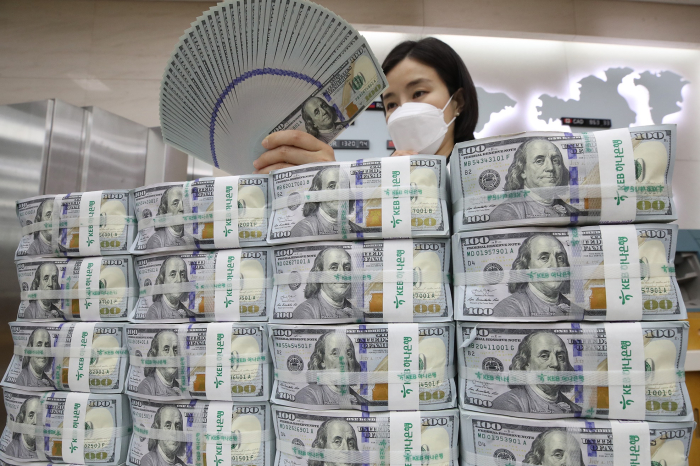S.Korea's public debt tops GDP for first time in 2020
Apr 07, 2021 (Gmt+09:00)
LG Chem to sell water filter business to Glenwood PE for $692 million


KT&G eyes overseas M&A after rejecting activist fund's offer


Mirae Asset to be named Korea Post’s core real estate fund operator


StockX in merger talks with Naver’s online reseller Kream


Meritz backs half of ex-manager’s $210 mn hedge fund



South Korea's government debt surpassed its gross domestic product for the first time in 2020, with public debt reaching its highest level ever following pandemic-related fiscal spending.
Government debt reached 1,985.3 trillion won ($1.8 trillion) at the end of last year, a 13.8% increase from a year earlier, according to 2020 financial statements prepared for a cabinet meeting on Apr. 6. The 2020 number topped the estimated GDP of 1,924.5 trillion won for Asia's No. 4 economy in the same year.
In 2019, public debt stood at 1,919 trillion won versus its GDP of 1,743.7 trillion won.
Considering the government's plan to issue over 100 trillion won worth of new debt this year to fund economic stimulus packages, government debt is estimated to swell to 2,100 trillion won by the end of this year.
Last year, the world's 11th-largest economy drew up four supplementary budgets to fight the COVID-19 economic fallout, making up for reduced tax income. Also last year, the government spent 67 trillion won more than it had planned at the start of 2020. Tax incomes shriveled by 7.9 trillion won to 285.5 trillion won in 2020, led by a decline in corporate taxes in the slowing economy.
As a result, South Korea posted 71.2 trillion won in a consolidated fiscal deficit, or total income minus spending.
The national debt per capita has been on the increase to 16.4 million won at the end of last year, compared with 12.1 million won in 2016, a year before the inauguration of the current Moon Jae-in government.
FISCAL BALANCE
But the government played down concerns about its fiscal balance. In a Tuesday briefing, a government spokesman underscored that the country has maintained fiscal stability.
He cited a slower pace of the debt-to-GDP ratio increase, based on the average for developed countries. Last year, South Korea's debt-to-GDP ratio climbed 6.2 percentage points from 2019, below the global average of 14.1 percentage points and the average 17.9 percentage points for advanced economies.
But University of Seoul taxation department professor Kim Woocheol said that excluding pensions and other social benefits, the government's fiscal deficit to GDP soared to 5.8% last year, higher than the 3.6% on a consolidated basis. He urged the government to lower the level to the 3% range.
Excluding liabilities relating to pensions for government employees and soldiers, the debt owed by both the central and local governments amounted to 846.9 trillion won as of the end of last year, up 123.7 trillion won from a year before. The debt-to-GDP ratio after pension liabilities rose to 44.0% from 37.7% in 2019.
By Jin-gyu Kang
Yeonhee Kim edited this article.
-
 MacroeconomicsKorea posts worst economic contraction since 1998; down 1%
MacroeconomicsKorea posts worst economic contraction since 1998; down 1%Jan 26, 2021 (Gmt+09:00)
1 Min read -
 Kospi market capS.Korea's stock market cap tops nominal GDP for the first time
Kospi market capS.Korea's stock market cap tops nominal GDP for the first timeJan 03, 2021 (Gmt+09:00)
2 Min read


